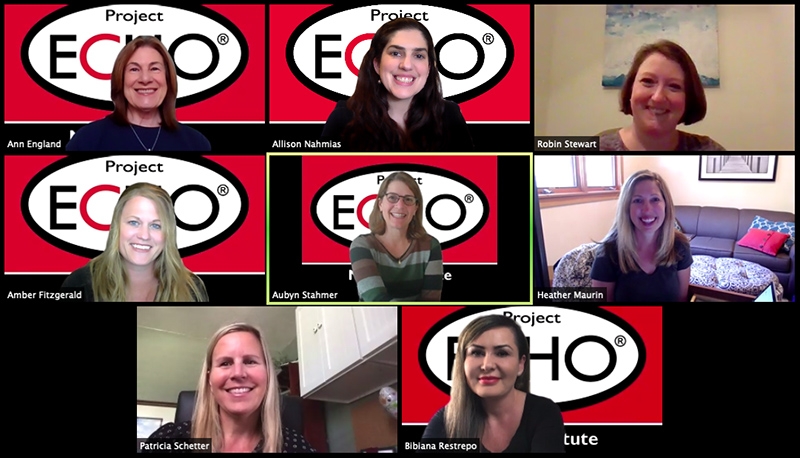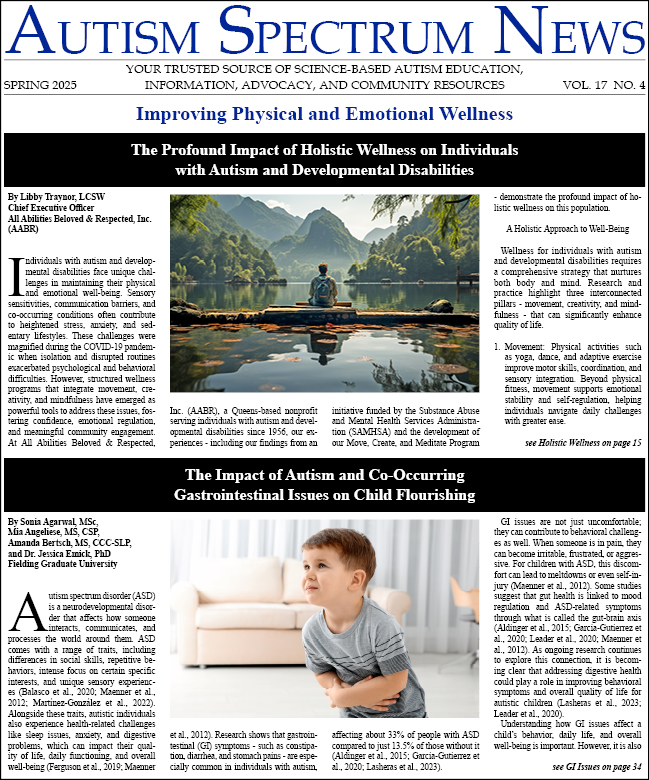The COVID-19 crisis has led to unprecedented school closures and a rapid transition to distance education which severely disrupted educational services for students on the autism spectrum. Distance learning will likely continue beyond the acute crisis as social distancing efforts persist. The Federal Department of Education issued guidance that schools are required to ensure that students with disabilities have equal access to distance learning. This massive and sudden shift in routine education services provides a unique challenge for educators working with students on the autism spectrum.

IDEA (USDOE, 2004) clearly stresses the importance of family-school collaboration. Research supports improved school outcomes when parents are involved in educational planning and intervention delivery (e.g., Iavannone et al., 2003; Moes & Frea, 2020; Sheridan et al., 2009). Parent-educator partnerships are considered best practice for students with autism (National Research Council, 2001). However, educators do not receive formal training in how to successfully partner with caregivers (Murray et al., 2011).
Parent involvement is essential for distance learning. It is heavily influenced by school support and therefore collaboration will be key in this context (Bebson, 2008). Early studies of online learning for students with disabilities suggest that parents take on a greater role that is similar to that of a teacher, involving structuring the educational day, using recommended interventions, and modifying activities to meet their children’s needs (Smith et al., 2016). Parents reported an increased need for effective parent-teacher communication and collaboration during online learning. Educators need immediate support in partnering with families to achieve educational goals through this new distance instruction method.
In an effort to support educators as they transitioned to distance education, we adopted the Project ECHO (Extension for Community Healthcare Outcomes) model as a platform for teaching educators how to best support students with autism and their families. Project ECHO aims to build a community of practice for complex medical conditions such as autism, increase system capacity, and disseminate evidence-based practices to rural and underserved areas.
Mazurek and colleagues adapted and tested ECHO Autism (www.echoautism.com) by developing virtual learning networks of providers with access to interdisciplinary autism expertise (ECHO Hub) to increase provider confidence in providing autism services (Mazurek et al., 2017, 2019). The Autism Center for Excellence (ACE) at the MIND Institute has an Autism ECHO team who partnered with the UC Davis Center for Excellence in Developmental Disabilities (CEDD) and the California Autism Professional Training and Information Network (CAPTAIN), which is the statewide initiative funded by the California Department of Education to build educator expertise in autism.
This team established the Special Edition: Autism Tele ECHO for Educators that aimed to equip school providers with tools, strategies, and resources to use a distance coaching model to assist families in setting up new learning routines for students with autism during home-based instruction. The program built on:
- the ECHO Autism format, including didactics and case-based learning;
- the AFIRM modules (https://afirm.fpg.unc.edu/afirm-modules), which provide instructions for using evidence-based autism practices; and
- evidence-based parent engagement and distance coaching strategies (Haine-Schlagel et al., in press; Vismara et al., 2012; Wainer & Ingersoll, 2013).
We began with a foundational session about best practices in distance coaching (technology trouble shooting, session structure), partnering with parents (collaborative goal setting; understanding context) and building parent engagement. The rest of the curriculum supported building a program in collaboration with caregivers that improved learning readiness, increased student engagement, and reduced behavior challenges. Specific topics included:
- use of visual schedules and an activity matrix for embedding instruction;
- strategies to support new learning routines and positive behaviors;
- using positive behavior support to address challenging behaviors; and
- strategies for building self-regulation to reduce anxiety.
The ECHO Hub was comprised of an interdisciplinary team with experience in public education including: Behavior Analyst, Speech Language Pathologist, Education Specialist, Social Worker, Parent, Developmental Behavioral Pediatrician, School Psychologist and Clinical Psychologist. The Autism Tele ECHO team limited enrollment to approximately 20 people to encourage discussion and community building. Response to Autism Tele ECHO was high, therefore we offered two sessions of each topic. On average, 19 educators (including special education teachers, behavior analysts, and speech language pathologists) participated in each session. Sessions included case-based learning and mentorship to promote participation during ECHO virtual learning. Educators shared challenges ranging from student refusal to attend distance classes with peers to supporting youth with co-occurring mental health conditions and limited resources. Participants also shared the results of implementing recommended strategies. For example, the strategy suggested for the student who refused to participate in distance classes began by recording his participation, slowly building a tolerance to distance learning. The result was that he started to participate in activities with his peers. Another participant supported a teenage student with autism and mental health concerns, significant elopement, and aggression challenges with a single parent. Through co-development of a plan prioritizing parent concerns and focusing on a small number of functional skills targeted during daily routines, behavior began to improve. Overall educators learned to support parents in embedding instruction naturally into daily routines so that home learning did not feel so overwhelming.
Following each session, participants completed an evaluation using a 5-point Likert scale (1=strongly disagree to 5=strongly agree). Average ratings for the usefulness and relevance of the didactic lesson were 4.7 (SD =0.61). Participants agreed or strongly agreed that their knowledge of each topic increased (mean = 4.4, SD=0.73) and felt the case presentations and discussions were applicable to their current needs (mean = 4.6, SD=0.71). Educators reported that they “loved the parent-teacher collaboration that was being established.”
The participants also commented on their experience with the program. One participant said “it is very valuable to hear the case and think through the challenging situation. I like the process of hearing from the different team members and their perspective from their experience and expertise.” Another participant shared, “I liked that the group was small enough for all of us to speak, introduce ourselves and ask questions. I feel more confident entering the world of remote online learning and being able to support families at home during this global pandemic.”
Sara Lighthall, Preschool Teacher at Elk Grove USD, commented that “The Echo training was so relevant to the dramatic change in teaching right now. The platform was perfect to allow teachers the space to take in information, ask thought provoking questions, then give and receive recommendations that could be used immediately to help our families. This training has been the highlight of my learning during Distance Teaching and am so thankful I was able to be a part of it.”
The ECHO Autism format is a promising method for providing distance support to educators. One main advantage for this program is its just-in-time support to those who need it, especially during a national crisis such as COVID-19 pandemic. The didactic portions of the sessions (publicly available at health.ucdavis.edu/mindinstitute/education/echo/echo-special-edition.html) have received over 1,500 views thus far.
Our team was heartened by the educators’ interest and commitment to learning new ways to partner with families during this crisis. IDEA regulation 34 C.F.R. 300.34 enables educators to help parents learn new skills to support a student in reaching educational goals; however, during usual education, teachers report needing additional time, structure, and support to build relationships with families (Jivanjee et al., 2007). The necessity of distance learning provides an opportunity to develop a new framework for partnership between educators and families.
Recently, researchers have developed training and consultation models that successfully build family-school partnerships that can lead to improvements in child outcomes at home and at school (Azad et al., 2018; Ruble et al., 2010). Distance education may increase communication and interaction between parents and teachers and enhance the collaborative parent-teacher relationship (Smith et al., 2016). We are hopeful that this model and educator experience partnering with parents will promote interdisciplinary collaboration and refine families-school partnerships.
Aubyn Stahmer, PhD, is Director of the UC Davis MIND Institute Center on Developmental Disabilities (UCEDD) and Dissemination Core Director for the UC Davis MIND Institute Autism Center for Excellence. Patricia Schetter, MA, BCBA is the Coordinator of Autism Education Initiatives for the UC Davis MIND Institute’s Center for Excellence in Developmental Disabilities (UCEDD) and the Executive Coordinator for the California Autism Professional Training and Information Network (CAPTAIN). Allison Nahmias, PhD is a Postdoctoral Scholar at the UC Davis MIND Institute Autism Center of Excellence. Ann England, M.A., CCC-SLP-L, is the Project Coordinator of the SELPA Content Lead-ASD, Marin County SELPA and CAPTAIN, of the California Department of Education and California Collaborative of Educational Excellence, California’s Statewide System of Support. Robin Stewart, LCSW, Ed.M. is a Community Programs Coordinator at the UC Davis MIND Institute. Bibiana Restrepo, MD, Developmental and Behavioral Pediatrician UC Davis MIND Institute. Amber Fitzgerald, MA, BCBA is Program Manager at the UC Davis MIND Institute. Heather Maurin, MA, LEP, BCBA-Special Education Manager in Pajaro Valley Unified School District. Bibiana Restrepo, Aubyn Stahmer, Robin Stewart and Amber Fitzgerald and Allison Nahmias are all part of the MIND Center of Excellence ECHO Autism Hub team.
This project is supported by a number of grants including the UC Davis Autism Center of Excellence (NICHD P50 HD093079), Center for Excellence in Developmental Disabilities (ACF) and the SELPA Content Lead-ASD with Marin County SELPA/CAPTAIN, Statewide System of Support (funded by the California Department of Education and California Collaborative for Educational Excellence).
References
Azad, G. F., Marcus, S. C., Sheridan, S. M., & Mandell, D. S. (2018). Partners in School: An Innovative Parent-Teacher Consultation Model for Children with Autism Spectrum Disorder. Journal of educational and psychological consultation, 28(4), 460–486. https://doi.org/10.1080/10474412.2018.1431550
Benson, P., Karlof, K., Siperstein, G.N. (2008). Maternal involvement in the Education of Young Children with Autism Spectrum Disorder. Autism, 12(1), 47-63.
Haine-Schlagel, R., Rieth, S., Stahmer, A.C., Dickson, K., & Brookman-Frazee, L. (in press). Adapting parent engagement strategies for an evidence-based parent-mediated intervention for young children at-risk for autism spectrum disorder. Journal of Community Psychology.
Jivanjee P, Kruzich JM, Friesen BJ, & Robinson A (2007). Family perceptions of participation in educational planning for children receiving mental health services. School Social Work Journal, 32(1), 75–92.
Mazuek, M.O., Stobbe, G., Loftin, R., Malow, B.A., Agrawal, M.M., Tapia, M., Hess, A., Farmer, J., Cheak-Zamora, Kuhlthau, K., & Sohl, K. (2019). ECHO Autism Transition: Enhancing healthcare for adolescents and young adults with autism spectrum disorder. Autism, 24(3): 633-644. doi: 10.1177/1362361319879616.
Mazurek, M. O., Brown, R., Curran, A., Sohl, K. (2017). ECHO autism: A new model for training primary care providers in best-practice care for children with autism. Clinical Pediatrics, 56, 247–256.
Mazurek, M. O., Curran, A., Burnette, C., Sohl, K. (2019). ECHO autism STAT: Accelerating early access to autism diagnosis. Journal of Autism and Developmental Disorders, 49, 127–137.
Moes, D., R., & Frea, W. (2002). Using family context to inform intervention planning for the treatment of a child with autism. Journal of Autism and Developmental Disorders, 32, 519-533.
Murray MM, Ackerman-Spain K, Williams EU, & Ryley AT (2011). Knowledge is power: empowering the autism community through parent-professional training. School Community Journal, 21(1), 19–36.
Ruble L.A., Dalrymple N.J., & McGrew, J.H. (2010). The effects of consultation on Individualized Education Program outcomes for young children with autism: The collaborative model for promoting competence and success. Journal of Early Intervention, 32(4), 286–301.
Sheridan SM, Warnes ED, Woods KE, Blevins CA, Magee KL, & Ellis C (2009). An exploratory evaluation of conjoint behavioral consultation to promote collaboration among family, school, and pediatric systems: A role for pediatric school psychologists. Journal of Educational and Psychological Consultation, 19, 106–129.
Wainer, A., & Ingersoll, B.R. (2012). Disseminating ASD interventions: a pilot study of a distance learning program for parents and professionals, Journal of autism and Developmental Disorders, 43(1)11-24. doi: 10.1007/s10803-012-1538-4.
Vismara, L., Young, G.S., & Rogers, S.J. Telehealth for expanding the reach of early autism training to parents. Autism Research and Treatment, doi: 10.1155/2012/121878. Epub 2012 Nov 22.





